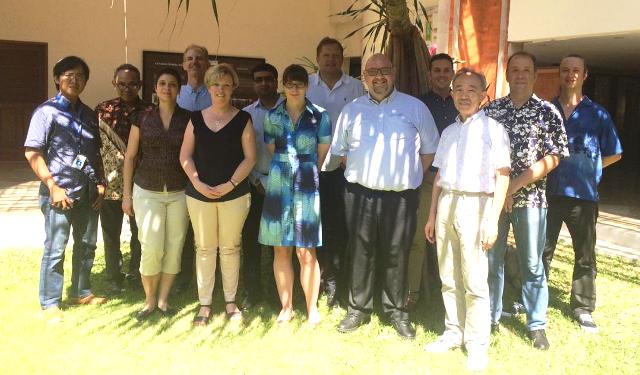
Background
In June 2014 the International Union of Radioecology (IUR) hosted an International workshop in La Baume, Aix en Provence, France on worldwide harmonization of radioecology networks. This workshop brought together 15 leaders and/or high-level representatives from various networks and international organizations active in the field to initiate the establishment of a global FORUM and identify a common agreed framework by means of which a worldwide coordination in radioecology could be achieved.
The South Pacific Environmental Radioactivity Association (SPERA) participated in the IUR Forum and for the first time SPERA was planning to hold its biennial conference in the South-East Asian region (in Bali, Indonesia) in cooperation with the Indonesian National Nuclear Energy Agency (BATAN) and the Australian Radiation Protection and Nuclear Safety Agency (ARPANSA). The SPERA-2016 conference was also held jointly with the 2nd International Conference on the Sources, Effects and Risks of Ionizing Radiation (SERIR). This provided an opportunity to draw on the lessons from the IUR Global Forum and to work with the IUR to hold a ‘Regional Forum’ and re-initiate discussion on role of the IUR task group ‘Activity survey of radioecology in Asia: Towards the Asian Network’ that had been established in 2010, but had seen little progress following the great-East Japan earthquake and tsunami and the subsequent Fukushima-Daiichi Nuclear Power Station disaster in March 2011.
The original purpose of the task group ‘Activity survey of radioecology in Asia: Towards the Asian Network’ was to establish a network that focused on development of environmental radioactivity in the Asian environment. However, in the intervening period a number of international and regional activities have progressed regional work in the field of environmental radioactivity and radioecology. Whilst aspects of the work that has been undertaken have addressed some of the needs identified in the original task group plan, the IUR considers that there is still a need to strengthen this network. Also, despite the Fukushima accident, nuclear power also continues to be important in many Asian countries in order to supply electricity required for their rapid economic development.
Objectives of the IUR Regional Forum
By hosting this Regional Forum the IUR wanted to provide an opportunity where international and regional stakeholders could meet, to identify and discuss key programs of work that are already underway or planned and where key research priorities might lay in the future. To provide an opportunity to discuss ways in which existing infrastructures could be shared and harmonised and regional training could be promoted for efficiency and to avoid gaps and duplication. The forum would also enable an opportunity to consider the revision of the terms of reference for the IUR task group. Of the 21 invited organisations, institutions and networks working within the Asia-Pacific region, representatives from 11 were able to attend and participate in the discussions at this initial workshop.
Program and presentations
During the morning and early afternoon attendees shared information about the goals and objectives of their organisations, ongoing research and development activities and their perspectives and orientations for the future. Where agreed, presentations are included below for information.
Opening and Objectives – IUR Regional Forum – Strengthening Radioecology in the Asia-Pacific
Per Strand (NRPA & IUR) and Gillian Hirth (ARPANSA & IUR)
IAEA Endeavours in Radioecology and Environmental Protection
Marcelle Phaneuf (IAEA)
The Australian Radiation Protection & Nuclear Safety Agency
Stephen Long (ARPANSA)
Marine Radioecology Activities in Indonesia
Heny Suseno (National Nuclear Energy Agency (BATAN))
Radioecology at ANSTO 2016 and into the future
Tom Cresswell (ANSTO / SETAC-Australasia) and Mat Johansen (ANSTO)
IUR Regional Forum: A New Zealand – ESR Perspective
Michelle Thomas (Institute of Environmental Science Research, ESR)
IUR Regional Forum: Fiji Perspective
Rajeev Lal (Fiji National University)
Environmental Research Institute of the Supervising Scientist: Research: Past, present and future directions
Peter Medley (eriss)
Radioecological Society in Japan
Hirofumi Tsukada (IER, Fukushima University)
The South Pacific Environmental Radioactivity Association (SPERA)
Andreas Bollhöfer (President, SPERA)
During the afternoon discussions focussed on how we might establish a regional network and strategies that could be employed to improve competence sharing and cooperative activities in the fields of radioecology and environmental radioactivity. Suggestions and areas of interest included:
-
Regional training courses in radioecology basics and/or radioecological assessment approaches.
-
Sharing information on laboratory capabilities and sampling/analysis methodology.
-
Closer interaction and awareness of the different research communities associated with IUR, SPERA and SETAC and improved communication and visibility of activities.
-
Approaches to encourage interest in radioecology, or the application of radiotracer techniques to studying other environmental/biological transfer processes.
In order to support these agreed common objectives it was proposed that through the IUR task group a survey to assess capabilities and resources, to identify training needs, and how various activities could support more efficient regional coordination of research and expertise should be conducted. The development of a strategy for future cooperative activities should also considered in the coming 12 months. A summary of the workshop and the agreed common objectives and a potential timeline of actions from the Bali Forum were presented at the close of the day.
Summary of Workshop – IUR Regional Forum – Strengthening Radioecology in the Asia-Pacific
Gillian Hirth (ARPANSA & IUR)
The IUR would like to acknowledge and thank all of the participants for their input and positive discussions during the workshop.
Gillian Hirth, IUR Regional Forum Coordinator

